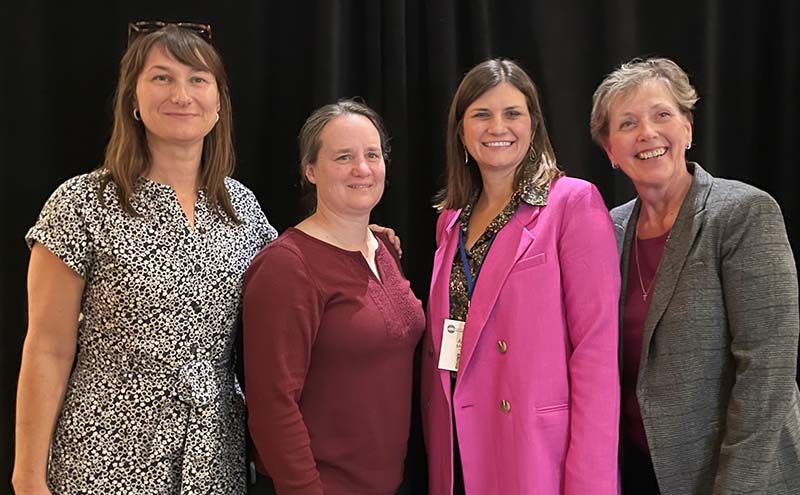Claire Pearson, MD, MPH, FACEP
Research Forum 2023 Chair

Dr. Pearson M.D., MPH, FACEP, is a Professor of Emergency Medicine at Wayne State University, the Director of Clinical Research at Ascension St. John in Detroit where she is also an attending physician. Dr. Pearson completed residency at Detroit Receiving Hospital and after graduation joined the Wayne State University Emergency Medicine Faculty. Early in her career she was site Principal Investigator for multiple studies for the Neurological Emergencies Treatment Trials (NETT) Network including POINT, SHINE and ESETT and sub-Investigator for three other NETT trials. In addition to Neurologic Research Dr. Pearson has been the site PI on two multicentered longitudinal trauma studies (funding from NIAMS), AURORA (Longitudinal Assessment of Post-Traumatic Syndromes) and AA CRASH (Applying Biopsychosocial Model to Post-MVC Pain Development in African Americans). She is currently site PI for Project SynERgy: Using Reinforcement Learning to Automatically Adapt a Remote Therapy Intervention (RTI) for Reducing Adolescent Violence Involvement (Funding : NICHHD) and Adaptive Interventions to Reduce Risky Drinking and Violent Behaviors among Adolescents (SafERteens M-Coach) (Funding: NIH). She is involved in Public Health endeavors in the Emergency Department including HIV screening and testing, smoking cessation and opioid misuse. Dr. Pearson is on the ACEP Research Committee and is Chair of the ACEP Research Forum. She is also the Chair of the Wayne State University School of Medicine Women in Medicine and Science Committee. She is passionate about Women Faculty Development and Gender Equity. She was awarded the Wayne State University Teaching Award (2021), Women in Medicine and Science Leadership Award (2020), and the American Medical Women’s Association – Mentor Award (2019).
Amber Sabbatini, MD, MPH, FACEP
Research Forum 2024 Chair

Dr. Sabbatini is a practicing emergency physician and federally-funded health services researcher who studies how the delivery of hospital care affects patient outcomes, resource utilization, and quality. To date, much of her work has revolved evaluating the impact of value-based payment policies and delivery system reforms on health outcomes and costs, especially for public payer populations. After residency, Dr. Sabbatini completed a research fellowship at the University of Michigan and then joined the faculty at University of Washington, where she was awarded an internal career development award (K12) in Patient-Centered Outcomes Research from the Agency for Healthcare Quality and Research. Dr. Sabbatini is currently appointed as an Assistant Professor of Emergency Medicine and Adjunct Assistant Professor of Health Systems & Population Health at the University of Washington. She serves as Core Faculty in the Section of Population Health in the Department of Emergency Medicine and within the Center for Health Policy and Innovation Studies in the School of Public Health. She has been PI of several federal and foundation awards, including an R34 from National Institute of Mental Health to examine the effects of Medicaid policies relating to health information exchange on mental health outcomes and an R01 from the National Institute of Aging where she is examining the unintended consequences associated with Medicare policies on outcomes for older adults with observation stays. Her work has been published in several high impact journals such as JAMA, NEJM, and Health Affairs and was utilized in the development of a novel emergency medicine episode-based cost measure to be implemented by CMS. In 2021, she was awarded the SAEM Young Investigator Award. Outside of research, Dr. Sabbatini has been involved in the regional implementation of Washington state’s Medicaid Transformation Project in King County, and has served on multiple workgroups related to improving care coordination and ED utilization among high needs Medicaid patients. She has a long history of service in organized medicine extending back to medical school. In residency, Dr. Sabbatini served on the Section Council of Emergency Medicine to the AMA House of Delegates and as a resident delegate to EMRA. She currently serves on the ACEP Research Committee and is Chair-elect of the ACEP Research Forum, as a member of the Emergency Medicine Data Institute Governance Team (representing the Research Committee), and has been an active member of QPSC for the past 3 years, working on the Measures Lifecycle subcommittee.
Margaret Greenwood-Ericksen, MD, MS
Research Forum 2025 Chair

Margaret Greenwood-Ericksen, MD, MSc is an Assistant Professor of Emergency Medicine at the University of New Mexico with a secondary appointment in Psychiatry and Behavioral Sciences Department. She is an emergency physician and health services researcher whose career is focused on transforming the structure of rural healthcare delivery to improve outcomes for vulnerable communities. Her research explores rural emergency care delivery models and associated outcomes to identify disparities and inform policy-level interventions. She has a particular interest in Medicaid policy and behavioral healthcare delivery to rural communities.
She completed her Master’s at the National Clinician Scholars Program at the University of Michigan following her residency training at the Harvard Affiliated Emergency Medicine Residency (HAEMR) Program. She is the past-president of the New Mexico ACEP Chapter, and served as ACEP’s representative to the National Quality Foundation’s committee for Rural Health Quality Measures. Within her Department, she serves as the Junior Faculty Representative to Senior Leadership and spearheaded the Clinical Scholars Research Program, a departmental research award which supports junior faculty seeking to become physician-researchers.
She is deeply invested in efforts to improve New Mexican’s health through innovations within Medicaid policy, mental health access, and opioid treatment. She is currently funded through New Mexico’s State Opioid Response (SOR) grant, awarded by SAMHSA, through which she is the Director for Outreach and Dissemination for the NM Bridge – a statewide program supporting hospitals and ED’s in initiation of Medications for Opioid Use Disorder programs. Within the Department of Psychiatry and Behavioral Sciences, she has an affiliation with the Center for Behavioral Health Services Research and Evaluation (CBHTR), leading teams to conduct assessments of the state’s Medicaid mental health and substance use policies. She has developed rural-specific curriculum for quality improvement and was a founding member of Project ECHO’s First Responder Resiliency ECHO which addresses the mental health needs of emergency medicine workers in rural communities. She has ongoing collaborations with the University of North Carolina’s Rural Health Research Program to inform implementation of the Centers for Medicare and Medicaid Services’ new rural healthcare payment and delivery model, the Rural Emergency Hospital. She is published broadly across rural health care delivery, rural health disparities, and rural emergency care outcomes and has received grant funding from the Emergency Medicine Foundation as well as UNM’s Clinical Translational Science Center.
Peter B. Pruitt, MD
Research Forum 2026 Chair

Dr. Pruitt is an assistant professor of emergency medicine at the Northwestern University Feinberg School of Medicine. He received his medical degree from the University of Maryland, a Master of Science from Northwestern University, and completed residency training at the Brigham and Women's/Massachusetts General Hospital Harvard Affiliated Emergency Medicine Residency (HAEMR). This was followed by an Agency for Healthcare Research and Quality (AHRQ)-sponsored T32 fellowship in health services and outcomes research at Northwestern University.
Dr. Pruitt’s research focuses on improving processes of care for emergency department patients, especially those with neurologic emergencies. He has a related area of interest in patient risk stratification, especially the creation and validation of clinical decision tools. In 2018 Dr. Pruitt received the SAEM Foundation Research Training Grant for his work to create a clinical decision tool for patients with subdural hematoma and preserved consciousness. He currently studies the interhospital transfer process with support from AHRQ.





